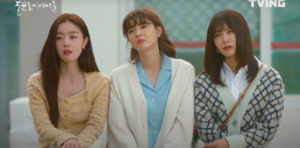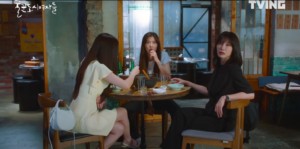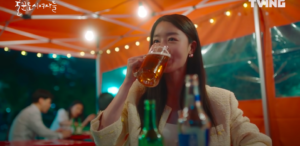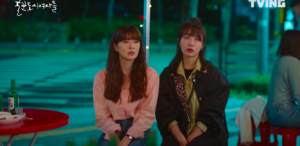
Viewers of Korean dramas should be familiar with soju, a Korean alcoholic beverage, a drink typically presented in a recognizable green bottle, and often a catalyst of drunken love confessions and outbursts. However, it would be difficult to find a drama in which soju has as much screen time as it does in the drama Work Later, Drink Now. The web drama, aired on Tving, is a hilarious show that celebrates the power of friendship (and alcohol).
Written by Wi So-young and directed by Kim Jung-sik, Work Later, Drink Now is a slice-of-life series that focuses on three friends: Ahn So-hee (Lee Sun-bin), a variety show writer, Han Ji-yeon (Han Sun-hwa), a yoga instructor, and Kang Ji-goo (Jung Eun-ji), who makes a living streaming herself folding origami. The three women are in their late 20s, and they are best friends and drinking buddies who are bonded together by their love for alcohol. Romance is definitely a part of the drama; So-hee’s questionable love interest Kang Book-Goo (Choi Si-won) rounds out the cast. However, Work Later, Drink Now is mostly centred on the three women as they experience–in both drunk and sober conditions–love and loss and everything in between.
Note: The rest of this review contains spoilers for the drama.
Dramas celebrating female friendships are not unusual, but dramas celebrating female friendships that revolve around being heavy drinkers definitely are. While Work Later, Drink Now may be more relatable and closer to our daily experiences than recent hit dramas like Netflix’s Squid Game or the recent Hellbound, it still serves as an example of the versatility that streaming services may provide. For some context, Work Later, Drink Now aired on the streaming service Tving, which was launched officially last year. The service is a part of CJ E&M which owns TV channels such as tvN and Mnet. Though the service is currently only available in Korea, it has plans to expand to other Asian countries soon.

Much like Netflix, Tving is another platform that can diversify the nature and content of dramas. Indeed, the drama’s 12 episodes range in length from 20 to 45 minutes, but none of them reach 60 minutes, which is the traditional running time of a drama. There are some more notable differences that set the drama apart from ones that air on TV; the characters drink heavily, but they also swear, smoke, and discuss their sex lives (or lack thereof) freely without any of it being censored out.
Aside from drinking, there are other activities that add to the characterization of the three perfectly imperfect adult women, which is done wonderfully throughout the drama. At first, Ji-yeon, Ji-goo, and So-hee fit nicely into their respective tropes. Ji-yeon is the stoic tomboy, Ji-yeon is the ditzy girly girl, and So-hee is the logical glue in their friendship that keeps everybody in check. Alcohol is, of course, the one that rounds out their tight-knit friend group. Their differences are highlighted in a variety of ways, from their fashion to taste in men.
Instead of pigeon-holing the women into these tropes, however, each episode gradually sheds light on details of their personalities while explaining how they became the women they are. For example, Ji-yeon’s intelligence, in particular her emotional intelligence, is highlighted through her respect for Ji-goo’s wishes to temporarily cut contact from her family and friends. Though she was the only one who was able to figure out Ji-goo’s whereabouts, she keeps quiet because she knows that it is what her friend needs.

Much of the drama takes place in the past, as a significant amount of time is dedicated to displaying the various highs and lows the trio experienced together. One flashback tells their origin story when, as university students, they formed a team to win a K-pop cover dance competition, for which the prize was a lifetime of free drinks. Another flashback tells the story of their careers; though none of them worked in the same field, they incite the wrath of a powerful man who ends up playing a key role in each of their career changes.
However, the plot of the drama is occasionally sacrificed to highlight the characters and their bonds with each other. For example, after Ji-goo and Ji-yeon have a fight, they make up when Ji-yeon is attacked in her home and Ji-goo is the first to reach her. The scene demonstrates Ji-goo’s unwavering loyalty and care for her friends, but there is never a follow-up on what happens to the attacker or Ji-yeon afterward. Did they know this man and did he face any consequences? Does Ji-yeon suffer from any trauma from the event? The drama does not address any of these questions, but instead utilizes the scene to demonstrate women’s friendship and development.

One of the more consistent parts of the drama is its tone, as Work Later Drink Now never fails to lose its funny and lighthearted atmosphere. Even at So-hee’s father’s funeral, scenes of Book-goo passed out in a spare room sprinkles in some laughs throughout the tears. Instead of undercutting the emotions at hand, however, any sudden tonal shifts serve the drama’s message well. After all, at the end of the day, the women will always have each other and alcohol to turn to no matter what they are celebrating or grieving; everything is going to be okay as long as they are together.
Work Later, Drink Now is hilarious for the entirety of its 12-episode run, and it has you rooting for the trio of women no matter how outrageous their drunk and sober antics may be. With an ambiguous ending and whispers of a second season, it’s very possible that the three women may be returning for round two.


